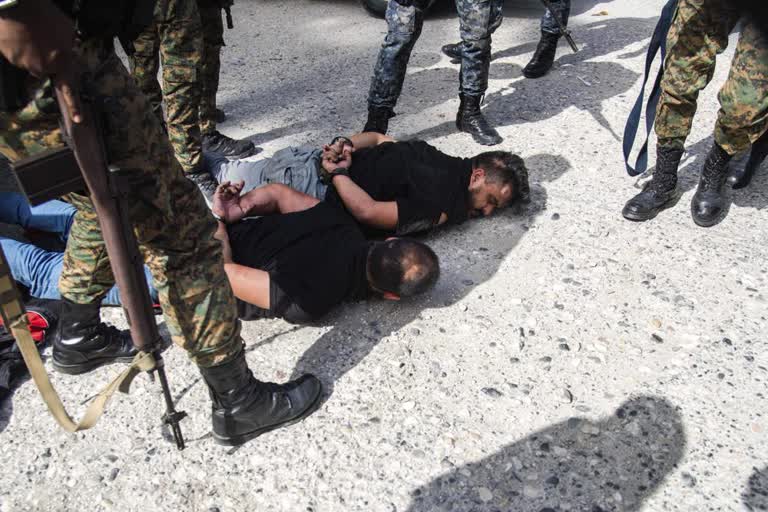PORT-AU-PRINCE (Haiti): Two men believed to be Haitian Americans — one of them purportedly a former bodyguard at the Canadian Embassy in Port au Prince — have been arrested in connection with the assassination of Haiti’s president, Haitian officials said Thursday.
James Solages and Joseph Vincent were among 17 suspects detained in the brazen killing of President Jovenel Moïse by gunmen at his home in the pre-dawn hours Wednesday. Fifteen of them are from Colombia, according to Léon Charles, chief of Haiti’s National Police. He added that three other suspects were killed by police and eight others are on the run. Charles had earlier said seven were killed.
“We are going to bring them to justice,” he said as the 17 suspects sat handcuffed on the floor during a press conference Thursday night. Late Thursday, Colombia’s government said six of the suspects in Haiti, including two of those killed, were retired members of Colombia’s army, though it didn’t release their identities.
Read: Haiti President Jovenel Moise assassinated at home
The head of the Colombian national police, Gen. Jorge Luis Vargas Valencia, said President Iván Duque had instructed the high command of Colombia’s army and police to cooperate in the investigation. “A team was formed with the best investigators ... they are going to send dates, flight times, financial information that is already being collected to be sent to Port-au-Prince,” Vargas said.
The oldest suspect is 55 and the youngest, Solages, is 35, according to a document shared by Mathias Pierre, Haiti’s minister of elections. He would not provide additional details about Solages’ background, nor provide the name of the second Haitian American. The U.S. State Department said it was aware of reports that Haitian Americans were in custody but could not confirm or comment. Solages described himself as a “certified diplomatic agent,” an advocate for children and budding politician on a website for a charity he established in 2019 in south Florida to assist residents.
On his bio page for the charity, Solages said he previously worked as a bodyguard at the Canadian Embassy in Haiti. The Canadian Embassy didn’t immediately comment; calls to the foundation and Solages’ associates at the charity either did not go through or weren’t answered. Witnesses said two suspects were discovered Thursday hiding in bushes in Port-au-Prince by a crowd, some of whom grabbed the men by their shirts and pants, pushing them and occasionally slapping them.
Police arrested the men, who were sweating heavily and wearing clothes that seemed to be smeared with mud, an Associated Press journalist said. Officers put them in the back of a pickup truck and drove away as the crowd ran after them to the nearby police station. Once there, some in the crowd chanted: “They killed the president! Give them to us. We’re going to burn them!” One man was overheard saying that it was unacceptable for foreigners to come to Haiti to kill the country’s leader, referring to reports from Haitian officials that the perpetrators spoke Spanish or English.
Read: Police gun down 4 after Haiti president assassinated
The crowd later set fire to several abandoned cars riddled with bullet holes that they believed belonged to the suspects, who were white men. The cars didn’t have license plates, and inside one of them was an empty box of bullets and some water. At a news conference Thursday, Charles, the police chief, urged people to stay calm and let the police do their work as he warned that authorities needed evidence they were destroyed, including the burned cars. Officials did not address a motive for the slaying, saying only that the attack, condemned by Haiti’s main opposition parties and the international community, was carried out by “a highly trained and heavily armed group.”
Not everyone was buying the government’s description of the attack. When Haitian journalist Robenson Geffrard, who writes for a local newspaper and has a radio show, tweeted a report on the police chief’s comments, he drew a flood of responses expressing scepticism. Many wondered how the sophisticated attackers described by police could penetrate Moïse’s home, security detail and panic room and then escape unharmed but were then caught without planning a successful getaway.
Meanwhile, a Haitian judge involved in the investigation said that Moïse was shot a dozen times and his office and bedroom were ransacked, according to the Haitian newspaper Le Nouvelliste. It quoted Judge Carl Henry Destin as saying investigators found 5.56 and 7.62 mm cartridges between the gatehouse and inside the house.
